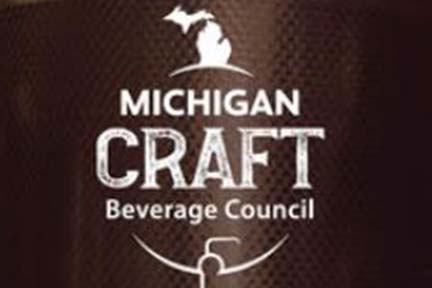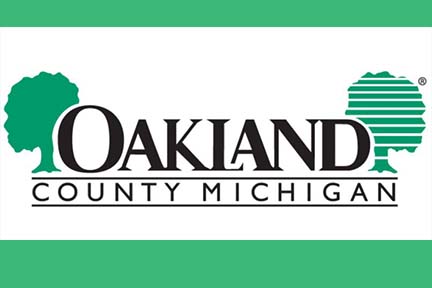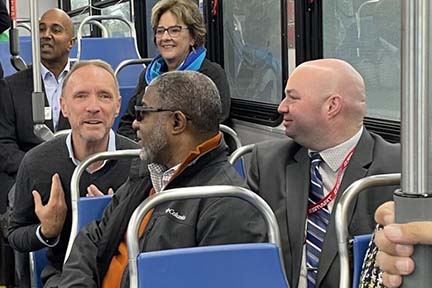
Anti-Robocall Task Force Issues Warning Letters
|
|
|
|

|
|
|
|

 |
|
This message is being sent as a public service on behalf of the Michigan Craft Beverage Council. For immediate release: November 6, 2023 Governor Whitmer Proclaims November as ‘Michigan Craft Beverage Month’ as the Holiday Season BeginsLANSING, Mich. — Today, Governor Gretchen Whitmer proclaimed November as Michigan Craft Beverage Month, recognizing Michigan’s robust craft beverage industry’s role in thriving economies and community vitality. “Our craft beverage industry brings communities across America together and supports tens of thousands of good-paying jobs,” said Governor Whitmer. “As governor and a lifelong fan of high-quality, Michigan-made products, I will continue taking action to grow our economy, invest in workforce development, and power our agriculture industry so these leading businesses can continue expanding right here in Michigan. Throughout Michigan Craft Beverage Month, I encourage Michiganders to join me in supporting Michigan’s craft beverage makers.” Throughout Michigan Craft Beverage Month, Michiganders are encouraged to support local businesses by including Michigan-made craft beverages into their holiday meal plans, gift giving, and other memory-making activities with family and friends. “The diversity and versatility of Michigan’s agriculture is on full display when it comes to our thriving craft beverage industry,” said Tim Boring, Director of the Michigan Department of Agriculture and Rural Development and chair of the Michigan Craft Beverage Council. “The specialty crops our state is known for, like apples, hops, and grain, allow the craft beverage sector to create innovative and flavorful products, exclusive to Michigan.” Michigan ranks sixth in the nation for the number of craft breweries, seventh for craft distilleries, and is a consistent national top producer of hard ciders. The state ranks ninth in the country for wine production, bottling more than 4 million gallons annually. With more than 300 breweries, 195 wineries, 85 distillers and 90 hard cideries across Michigan, the industry thrives at the intersection of agricultural business development, tourism, and community investment, both rural and urban. Craft beverage businesses directly contribute to the economic vitality of communities. It’s common to see them revitalizing main street buildings and lesser developed industrial areas, often acting as an anchor for more development. Wineries, breweries, cideries, and distilleries also impact rural communities, creating jobs and bolstering tourism. “Thank you to the Michiganders who are already steadfast ambassadors of our one-of-a-kind industry,” said Jenelle Jagmin, director of the Michigan Craft Beverage Council. “We ask you to share your support this holiday season, using your spending decisions to support local business and Michigan-made products. Happy Michigan Craft Beverage Month!” To learn more about the Michigan Craft Beverage Council and find Michigan craft beverage businesses near you, visit michigancraftbeverage.com. |

|
|||
|

Pontiac, Mich. – Oakland County Animal Shelter and Pet Adoption Center is now open on Saturdays and expanding its hours on Tuesdays and Thursdays to make it more accessible and convenient for people to adopt a pet or purchase a dog license.
The shelter has an unprecedented number of dogs and cats that need loving homes. In response, County Executive Dave Coulter’s administration worked with the Board of Commissioners to hire four additional employees to support the additional hours that the pet adoption center is open.
“There’s no better time to get a friend for life than right now,” said Oakland County Executive Dave Coulter. “We want to make it as convenient and accessible as possible for residents to head to the Pet Adoption Center and check out all the great dogs and cats, who are patiently awaiting their forever home.”
Beginning Nov. 4, Oakland County Animal Shelter and Pet Adoption Center will be open 10 a.m. to 4 p.m. on Saturdays. In addition, the pet adoption center will be open until 7 p.m. on Tuesdays and Thursdays starting Nov. 7.
“We believe that by being open to the public on Saturdays and later two days during the week, we will enable the public to have additional opportunities to come to the shelter to interact with our adoptable pets and hopefully pick out a furever loving addition to their family,” said Bob Gatt, shelter manager.
Currently, there are at least 125 dogs and more than 80 cats available at the pet adoption center.
Dog licenses for 2024 are available beginning Dec. 1. Proof of a current rabies vaccine is required to purchase a license. The shelter is offering free rabies vaccines every Tuesday morning from 9 a.m. until noon when the pet owner purchases a license at the same time.
The Oakland County Animal Shelter and Pet Adoption Center is located at 1200 N. Telegraph Road, Bldg. 42E, in Pontiac on the county government campus. To contact the pet adoption center, call 248-858-1070 or email [email protected]. For more information about adopting a pet, go to www.oakgov.com/petadoption.

Pontiac, Mich. – Oakland County Executive Dave Coulter and the Oakland County Board of Commissioners, in partnership with the nonprofit organization RIP Medical Debt, will leverage $2 million of the county’s American Rescue Plan Act (ARPA) dollars to purchase up to $200 million in medical debt of Oakland County residents for a fraction of its cost, then wipe clean their debt.
“No matter what a person’s circumstances are, a medical crisis can be devastating for them and their families – physically, financially, and emotionally,” said Oakland County Executive Dave Coulter during a news conference at Gilda’s Club Metro Detroit in Royal Oak on Thursday, Oct. 19. “We should do what we can to help people who find themselves on the brink of bankruptcy due to a health condition or emergency.”
Approximately 114,000 Oakland County residents carry medical debt. It is the number one source of bankruptcy in the United States and is especially prevalent in communities of color and rural areas. The average medical debt is $2,500 per household. Oakland County’s medical debt elimination program has the potential to help up to 80,000 residents.
“Medical debt hurts working families, ruins credit, and makes life more expensive,” Board of Commissioners Chair David T. Woodward of Royal Oak said. “Wiping out medical debt for county families is one more way we’re building an economy that works for everyone, from the bottom up and the middle out.”
The non-profit RIP Medical Debt is a national organization that acquires and abolishes medical debt for people experiencing financial hardship. Its qualifications for relief are debts belonging to people who earn less than four times the federal poverty level or for whom a debt is five percent or more of one’s annual income. Once a contract is in place, their staff will implement Oakland County’s medical debt elimination program by working with area hospitals to identify residents who fit the criteria for relief. Then on behalf of the county, RIP Medical Debt will buy the medical debt for pennies on the dollar and abolish it.
“We know that medical debt is detrimental to health because families delay care when they have debt which increases the burden of disease in communities,” said Deputy County Executive Madiha Tariq, who oversees the Health and Human Services Department. “Medical debt is also a huge blow to our economy, impacting the workforce, housing, and deepening the cycle of poverty.”
This is not a medical debt relief program to which residents can apply. RIP Medical Debt will notify individuals by branded letter that some or all their debt has been canceled and cleared from their credit reports.
Michigan resident Kyra, who lives with the challenges of diabetes, shared her story with news conference attendees. RIP Medical Debt purchased and wiped clean approximately $3,500 of her medical debt.
Kyra was diagnosed with diabetes at age 10 – a chronic condition that runs in her family. During her teen years, her family’s medical insurance paid for the management of her condition. As a young adult, she was without medical insurance coverage, accumulating debt, and struggling to keep her job. After RIP Medical Debt purchased and abolished her debt, she was able to move her life forward. Today, she is working a job which pays more than she earned when she was under the burden of medical debt.
“Being free from medical debt is a breath of fresh air,” Kyra said. “No bothering calls or threatening letters. To be honest, I don’t feel overwhelmed anymore and this all happened at the right time.”
Gilda’s Club Metro Detroit, which provides support, education and wellness programming to cancer patients and families, has witnessed the toll of medical debt on their community.
“Financial toxicity is among the top stressors of families facing cancer,” said Laura Varon Brown, CEO of Gilda’s Club Metro Detroit. “At a time when families have so many complexities and fears weighing on them, how to pay for hope should not be among them.”
Oakland County Commissioner Charlie Cavell of Ferndale, representing District 19, who has been an advocate for this program at the Board of Commissioners, voted yes for this program when it won final board approval on Tuesday, Oct. 17. Next up, RIP Medical Debt and the county will enter into a contract while the non-profit approaches local hospitals to source qualifying medical debts for abolishment.
“In my 20’s, I was unable to afford insurance and got sick on a mission trip. I had more than $6,000 in medical debt, which kept me from seeing the doctor, building credit, accessing job opportunities because I could not get a car loan, and more,” Cavell said. “Learning from RIP Medical Debt that there are tens of thousands of families in Oakland County going through the same thing I went through, and then having a solution for their situation was a humbling and transformational experience for me, and something that’s been meaningful to bring to my work as a commissioner.”
With support from state and local governments, individual donors, philanthropic organizations, and faith-based organizations, RIP Medical Debt, founded in 2014 by former debt collectors, has acquired and abolished more than $10 billion in medical debt for more than seven million people. To achieve this, they partner with hospitals, health systems, and physician groups to acquire medical debt for abolishment. For more information about RIP Medical Debt, go to www.RIPMedicalDebt.org.

Pontiac, Mich.– Public transit is making strides in Oakland County nearly a year after voters approved a public transportation millage. Multi-year agreements were in place with SMART, Western Oakland Transportation Authority (WOTA), North Oakland Transportation Authority (NOTA), the Older Persons’ Commission (OPC), and People’s Express weeks after the vote while route and service planning continues with input from communities, businesses, and residents.
“Easily accessible, reliable and affordable transportation will help make Oakland County an even more attractive destination for residents, employers and visitors,” said Oakland County Executive Dave Coulter. “Countywide public transportation has always been a top priority for me and the progress that has been made since voters agreed to fund the expansion is truly remarkable.”
Oakland County and its transportation service providers are expanding and improving public transit as the planning process continues. Some highlights include:
“We are pleased to work with Oakland County Executive Dave Coulter and Oakland County Board of Commissioners Chairman David T. Woodward in supporting their efforts and those of the residents in providing greater access to communities by way of SMART’s bus transit in Oakland County. The expansion of routes provides economic growth, economic security, and regional competitiveness,” said Dwight Ferrell, general manager of SMART.
Oakland County’s transit goals include the growth of demand response through the county’s four local operators and SMART Flex for the public to schedule point-to-point rides.
“Better transit in Oakland County unlocks more opportunities for residents,” Board Chairman David T. Woodward said. “New routes to more destinations is one more step to creating the most connected, accessible and equitable transit system in our region’s history.”
The county’s other goals are to coordinate services among the different transit providers, expand transit to unserved and underserved areas, develop a long-term countywide plan that considers all transit options and where they should be implemented, enable more seamless transit trips, make transit stops easier, safer and more comfortable, implement higher frequency, higher capacity transit including bus rapid transit, support the transition to low/zero-emission transit vehicles, and support transit-oriented development.
As Oakland County transit grows, transportation providers are still experiencing hiring challenges and delays in getting equipment which have slowed some efforts this year. The county and its transit providers, however, are working to resolve these issues so the entire system is stronger next year.
Of the total budget for the 10-year, 0.95 millage for transit approved by voters in November 2022, 79 percent of the funds are directed to transportation services with SMART, NOTA, WOTA, OPC and People’s Express. This year, one percent went to local governments for reimbursement for transportation they provided in 2023. Another one percent has paid administration costs. The remaining 19 percent is available for future services and service access enhancements.
SMART serves a more populous portion of the county while WOTA, NOTA, OPC and People’s Express cover a greater geographic area.
Additional information about transit services can be found on the Transit Division’s website at oakgov.com/OaklandTransit.